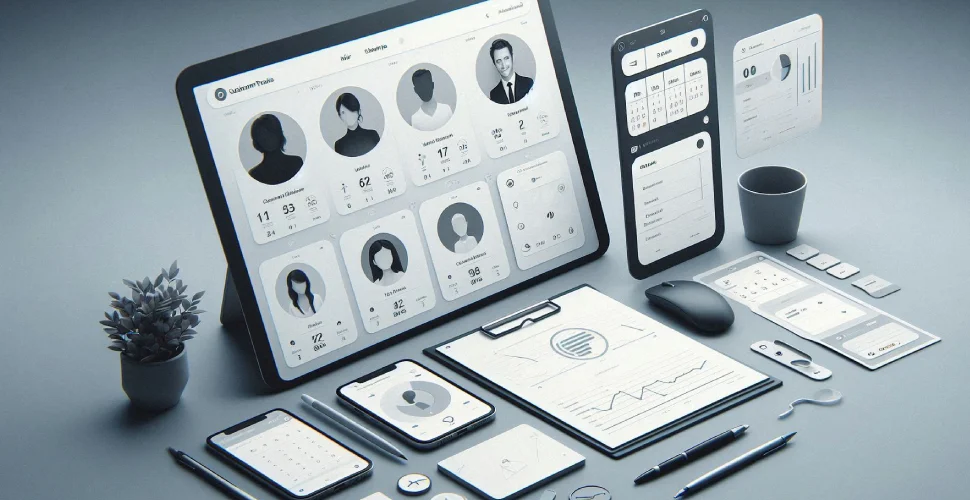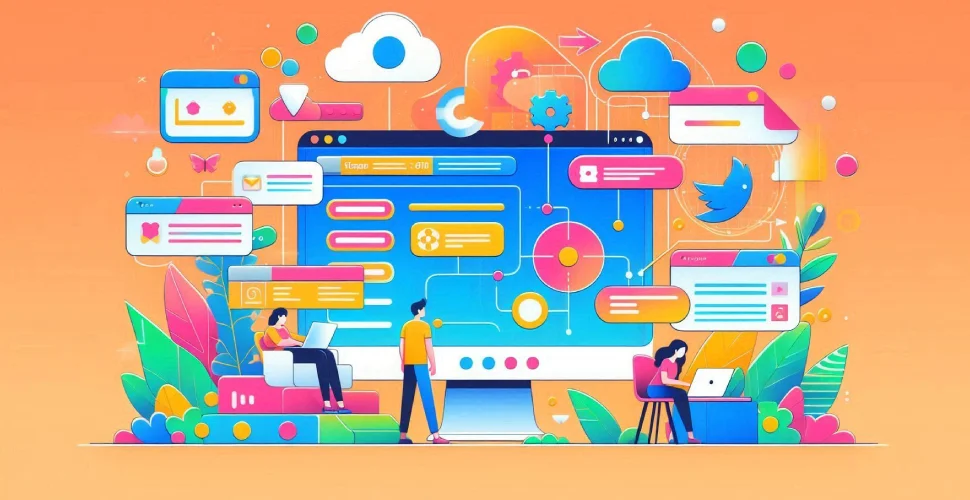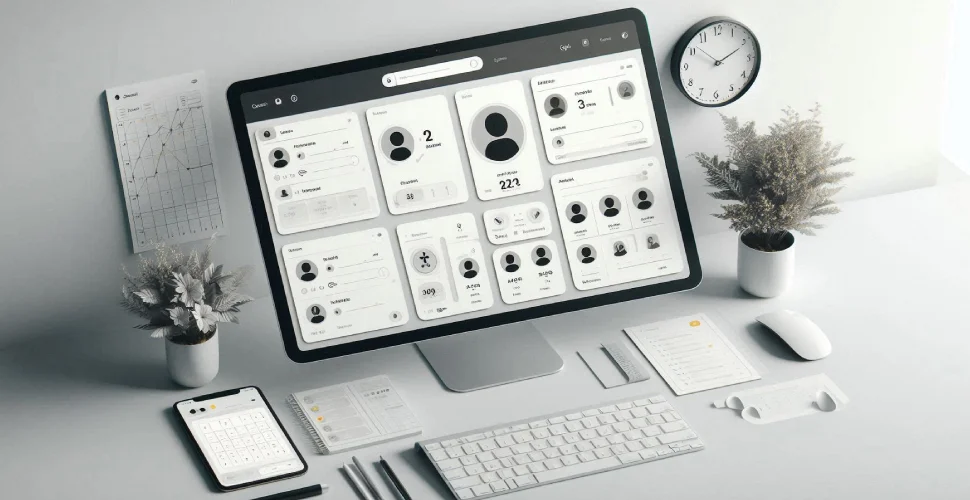How to Build a CRM: A Step-by-Step Guide

Introduction
In today's competitive landscape, businesses are constantly looking for ways to streamline operations, optimize customer experiences, and drive growth. A powerful tool in this quest is a Customer Relationship Management (CRM) system. More than just a database, a CRM acts as a central hub for managing all your interactions with customers, from initial contact to long-term loyalty.
However, building a custom CRM can feel daunting. This article provides a comprehensive, step-by-step guide to help you navigate the process from ideation to implementation. We'll delve into essential considerations like defining your specific needs, choosing the right technology, and crafting a system that aligns with your business objectives. Whether you're a startup looking to establish a strong foundation or an established company seeking to enhance customer engagement, this guide will equip you with the knowledge and tools to create a winning CRM that fuels your success.
What is CRM?

Customer relationship management (CRM) is a crucial aspect of any successful business strategy. It refers to the practices, tools, and technologies used by companies to manage and analyze customer interactions and data throughout the customer lifecycle. The main goal of CRM is to optimize customer relationships by understanding their behavior, preferences, and needs in order to improve overall satisfaction and loyalty. This can be achieved through various strategies such as personalized communication, targeted marketing campaigns, and efficient customer service. In short, CRM is a comprehensive framework that allows businesses to build strong relationships with customers and enhance their experience with the aim of driving growth and profitability.
Benefits of Building Your Own CRM
Building your own CRM (Customer Relationship Management) system can offer numerous benefits for businesses. Here are some key advantages of creating a customized CRM:
Personalization
By building your own CRM, you have control over what features and functions are included, allowing you to tailor it specifically to meet the needs of your business.
Cost-effective
Instead of paying for a pre-made CRM that may include unnecessary features, building your own can be more cost-effective as you only invest in what your business requires.
Integration
A custom-built CRM can easily integrate with other systems or software used within the company, providing a seamless flow of data and information.
Scalability
As your business grows and evolves, so can your CRM system. With a custom-built solution, you can add new features or make changes as needed to accommodate growth.
Greater control and flexibility
Building your own CRM gives you complete control over its design and functionality, allowing for easier modifications as business needs change.
Improved data security
With a personally built system, you have the option to implement stronger security measures to protect sensitive customer data from potential cyber threats.
Enhanced user adoption
Your employees may find it easier to adopt and use a system that is tailored to their specific roles and tasks, resulting in better overall productivity.
Tips on Creating an Effective CRM Interface

A Customer Relationship Management (CRM) system is only as good as its usability. If your CRM interface is clunky, confusing, or simply doesn't cater to your team's needs, it's unlikely to be used effectively. This article explores key tips to create a CRM interface that empowers your team and drives positive results.
Start with Your Users
- Understand their needs: Conduct interviews, surveys, and user testing to gather insights into how your team interacts with data, what tasks they perform frequently, and what their pain points are.
- Design for their roles: Consider the specific needs of different team members. Sales reps may require quick access to contact details and deal history, while marketing teams might focus on campaign performance and lead nurturing.
- Prioritize usability: Keep it simple and intuitive. Embrace clear language, logical navigation, and readily accessible key information.
Embrace a User-Friendly Design
- Clean and uncluttered layout: Minimize distractions and focus on core functionality. Avoid overwhelming users with too much information on a single screen.
- Visual hierarchy: Use color, size, and spacing to guide users' attention and prioritize important information.
- Intuitive navigation: Ensure users can easily find what they need without getting lost in menus or subfolders.
- Consistent design: Maintain a consistent look and feel across all sections and modules. This fosters familiarity and reduces the learning curve.
Streamline Data Entry and Management
- Automate data capture: Integrate with other platforms like email, calendar, and social media to automatically capture customer interactions and relevant information.
- Pre-populated forms: Use default values and pre-filled fields to reduce typing and ensure data consistency.
- Data validation: Implement rules and checks to prevent errors and ensure data integrity.
- Customizable dashboards: Allow users to personalize their dashboards to display the most relevant metrics and information for their roles.
The Step-by-Step Guide to Building a Customized CRM System

In today's competitive business landscape, a robust and customized CRM (Customer Relationship Management) system is essential for managing and nurturing customer relationships effectively. While there are many off-the-shelf CRM solutions available, building a customized CRM system can offer tailored features and functionality that cater specifically to the unique needs of your organization.
Here is a step-by-step guide to help you build a customized CRM system:
Step 1: Define Your Goals and Requirements
Begin by clearly defining the objectives and requirements for your CRM system. Identify the specific business processes you want to improve, such as sales tracking, lead management, or customer support. Determine the key data points and functionality that are essential to your organization.
Step 2: Choose a Technology Stack
Select a technology stack that aligns with your technical capabilities and development resources. Consider the programming languages, databases, and development tools that will be used to build your CRM system. Open-source options like Python and MySQL can be cost-effective, while proprietary solutions may offer more advanced features.
Step 3: Design the System Architecture
Design the architecture of your CRM system, including the data model, user interface, and integration points. The data model should define the data structures and relationships that will store customer information, interactions, and other relevant data. The user interface should be intuitive and easy to navigate for users.
Step 4: Build the Core Modules
Start by developing the core modules of your CRM system, such as:
- Contact Management: Manage customer profiles, including personal data, communication preferences, and interaction history.
- Sales Pipeline Management: Track sales opportunities through different stages of the pipeline, manage quotes, and close deals.
- Lead Management: Capture leads, nurture them through marketing campaigns, and qualify them for sales.
- Customer Service Management: Manage customer support tickets, track resolution times, and provide personalized assistance.
Step 5: Integrate with Other Systems
Integrate your CRM system with other critical business systems, such as ERP (Enterprise Resource Planning), marketing automation, and e-commerce platforms. This will facilitate seamless data exchange and automate business processes.
Step 6: Implement and Train Users
Once the CRM system is developed, implement it in your organization. Provide comprehensive training to users to ensure they can effectively leverage the system's features and functionality.
Step 7: Monitor and Maintenance
Regularly monitor the performance and effectiveness of your CRM system. Make necessary adjustments and upgrades to ensure it continues to meet the evolving needs of your business.

Conclusion
Building a customized CRM system can significantly enhance your business operations by streamlining processes, improving customer engagement, and driving growth. By defining your specific needs, choosing the right technology stack, designing a user-friendly interface, and integrating essential modules, you can create a CRM tailored to your unique business objectives. Regular monitoring and maintenance ensure your CRM adapts to the evolving landscape, keeping your business competitive.
If you're looking for expert guidance in developing a custom CRM or any other software solution, consider partnering with Innow8 Apps Software Development Company. With a track record of delivering innovative, scalable, and secure software solutions, Innow8 Apps is your go-to partner for transforming your business ideas into reality.
Let us help you build a CRM system that not only meets but exceeds your expectations, empowering your team and delighting your customers. Contact Innow8 Apps today to embark on your journey toward technological excellence.
FAQs
What are the key components of a CRM system?
A comprehensive CRM system typically includes modules for:
- Contact Management: Store and manage customer details, including contact information, demographics, purchase history, etc.
- Sales Management: Track leads, opportunities, deals, and sales pipeline.
- Marketing Automation: Execute automated marketing campaigns, track email opens, and analyze performance.
- Customer Service: Manage support tickets, track customer interactions, and resolve issues efficiently.
- Reporting and Analytics: Generate reports and dashboards to visualize customer data, measure performance, and identify trends.
How do I choose the right CRM platform for my business?
Consider the following factors when choosing a CRM platform
- Business size and needs: Select a platform that can scale with your business growth.
- Budget: Determine how much you're willing to invest in a CRM solution.
- Features: Choose a platform that offers the features you need, such as marketing automation, sales pipeline management, or customer service tools.
- Integrations: Make sure the platform integrates with other tools you use, like email marketing platforms, accounting software, or social media platforms.
- Ease of use: Choose a platform that is intuitive and easy for your team to learn and use.
Can I build a CRM from scratch or should I use a pre-built solution?
Building a CRM from scratch requires significant technical expertise, time, and resources. It's usually more practical and cost-effective to leverage a pre-built CRM solution. However, if you have specific requirements that no available platform can fulfill, building your own CRM might be necessary.
Unlock the future of architecture with AI
Recent Blogs:

Cost of AI Voice Generator App Development
Learn the cost of creating an AI voice generator app. Explore factors, estimates, and tips f...
Read More
Top 8 Advantages of On-Demand Apps | Build an...
On-demand apps- Looking to take your business to next level? checkout these top 8 advantage ...
Read More
Metaverse Wedding Platform-Is it a New Trend ...
Curious about metaverse wedding platform? Read our full blog to know is it a new trend or ju...
Read More